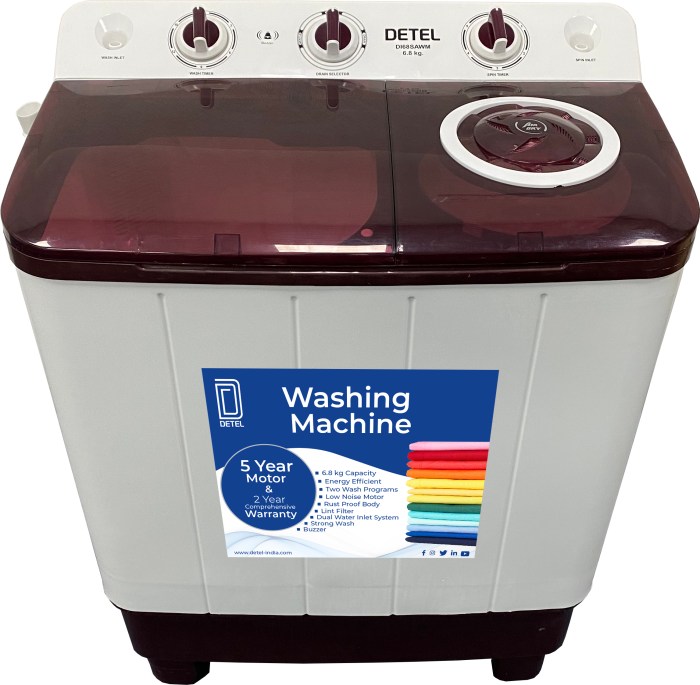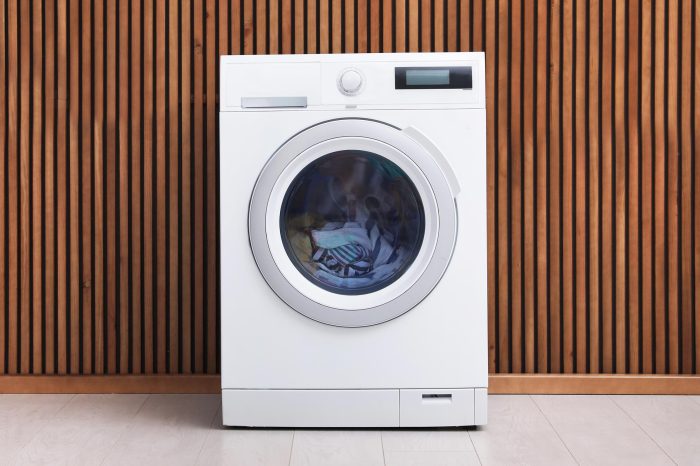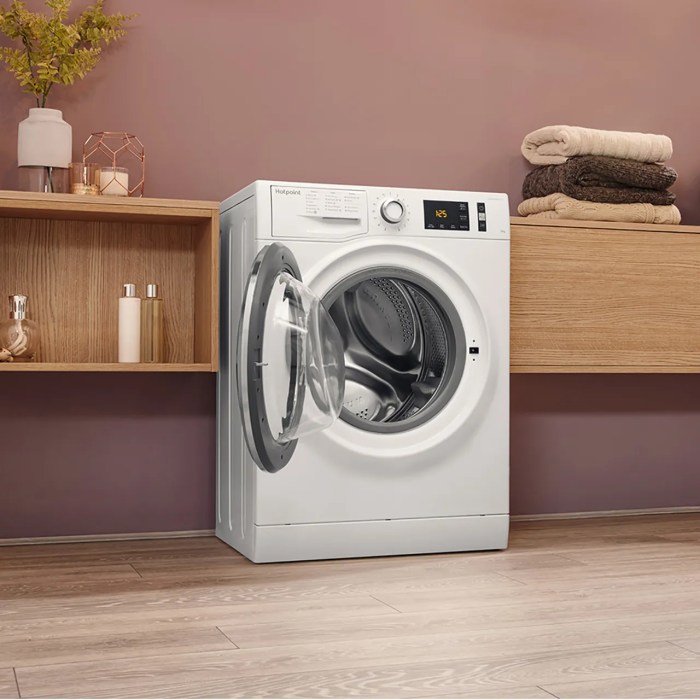Step into the world of washing machines, where convenience and efficiency intertwine. From understanding the diverse types to mastering maintenance, this comprehensive guide will equip you with the knowledge to make informed decisions and keep your laundry routine running smoothly.
Whether you’re a seasoned pro or a laundry novice, this guide has something for everyone. Dive in and discover the secrets to a spotless laundry experience.
Types of Washing Machines
Washing machines are an essential household appliance that makes the task of cleaning clothes easier and more efficient. With various types available in the market, it’s important to understand their differences to make an informed decision when purchasing one.
The following table provides a detailed overview of the different types of washing machines, their features, advantages, and disadvantages:
| Type | Capacity | Features | Price Range |
|---|---|---|---|
| Top-Load Washing Machines | 6-12 kg |
|
$200-$600 |
| Front-Load Washing Machines | 8-15 kg |
|
$400-$1,200 |
| Compact Washing Machines | 2-4 kg |
|
$150-$300 |
| Smart Washing Machines | Varies depending on model |
|
$600-$1,500 |
Features to Consider When Buying a Washing Machine

When selecting a washing machine, several key features should be considered to ensure it meets your specific needs and preferences. These include:
Capacity, Washing machine
Capacity refers to the amount of laundry the machine can handle in one wash cycle. It is measured in kilograms (kg) or cubic feet (cu. ft.). A larger capacity is suitable for larger households or those who frequently wash bulky items like bedding.
Energy Efficiency
Energy efficiency indicates how much electricity the machine consumes during operation. Higher-efficiency models can save energy and reduce utility bills. Look for machines with an Energy Star rating to ensure optimal energy savings.
Wash Cycles
Different wash cycles are designed for specific types of fabrics and soil levels. Consider the types of laundry you typically wash and choose a machine with cycles that suit your needs. Common cycles include regular, delicate, heavy-duty, and quick wash.
Spin Speed
Spin speed determines how fast the machine spins during the spin cycle, removing excess water from the laundry. Higher spin speeds can reduce drying time, but may also increase wear and tear on delicate fabrics.
Noise Level
Noise level is an important consideration if the machine will be located in a noise-sensitive area. Some machines feature quiet operation modes to minimize noise disturbance.
How to Choose the Right Washing Machine for Your Needs

Selecting the ideal washing machine can be a daunting task with the myriad of options available. To simplify the process, consider the following factors:
Family Size and Laundry Habits
The size of your family and your laundry habits significantly influence your choice. For large families or those with frequent laundry loads, a machine with a larger capacity (7-10 kg) is recommended. If space is a constraint, consider a compact washer (3-5 kg).
Budget
Washing machines come in a wide price range. Determine your budget before shopping to narrow down your options. Consider the cost of the machine, installation, and ongoing expenses such as detergent and energy consumption.
Space Constraints
Measure the available space in your laundry area to ensure the machine fits comfortably. Consider the dimensions of the machine, as well as the space required for loading and unloading.
For all your bedding, bathroom, and home décor needs, look no further than bed bath and table . With an extensive selection of high-quality products, you’re sure to find everything you need to create a comfortable and stylish living space.
Washing Machine Maintenance and Troubleshooting
Maintaining your washing machine ensures optimal performance, longevity, and prevents costly repairs. Troubleshooting common issues promptly helps identify and resolve problems before they escalate.
Cleaning and Descaling
- Regularly clean the detergent dispenser, drain pump filter, and door gasket to remove dirt, lint, and detergent residue.
- Descale the machine every 3-6 months using a commercial descaler or a mixture of vinegar and water to remove mineral buildup.
Resolving Leaks
- Check for leaks around the door seal, hoses, and drain pump.
- Replace worn or damaged seals and hoses.
- Tighten loose connections at the water supply and drain outlets.
Addressing Noises
- Rattling or banging noises may indicate an unbalanced load or a loose component.
- Grinding or screeching noises could be caused by worn bearings or a damaged belt.
- If the machine is vibrating excessively, check for uneven flooring or a heavy load.
Error Codes
- Refer to the user manual for specific error code meanings.
- Common error codes indicate issues such as water supply problems, drainage issues, or motor failures.
- Reset the machine or contact a qualified technician if the error persists.
Energy-Efficient Washing Practices
To minimize energy consumption while using washing machines, it is crucial to adopt energy-efficient practices. These include selecting the appropriate wash cycle, utilizing cold water, and optimizing load size.
By implementing these practices, not only can you save energy but also reduce your environmental impact. Energy-efficient washing practices contribute to a more sustainable lifestyle and help preserve natural resources.
Selecting the Right Wash Cycle
- Choose the shortest wash cycle that meets your cleaning needs. Shorter cycles consume less energy.
- Use the “Eco” or “Energy-Saving” cycle if available. These cycles are designed to optimize energy efficiency.
- Avoid using the “Heavy Duty” or “Bulky” cycles unless absolutely necessary. These cycles use more energy and water.
Using Cold Water
Heating water accounts for a significant portion of a washing machine’s energy consumption. By using cold water instead of warm or hot water, you can reduce energy usage by up to 90%.
Cold water is effective at removing most stains and dirt, making it a viable option for most laundry loads.
Create a cozy and inviting space in your home with a luxurious velvet sofa bed . This versatile piece seamlessly transforms from a comfortable sofa to a spacious bed, providing the perfect solution for both relaxation and overnight guests. The soft, velvety fabric adds a touch of elegance and sophistication to any room.
Optimizing Load Size
Washing smaller loads more frequently is more energy-efficient than washing larger loads less often.
- Avoid overloading the washing machine. This can lead to poor cleaning results and increased energy consumption.
- Fill the washing machine to about 80% capacity. This allows the clothes to move freely and get cleaned effectively.
- If you have a small load, use the “Small Load” or “Delicates” cycle to save energy.
Final Wrap-Up

In the realm of household appliances, the washing machine stands as a testament to innovation and convenience. This guide has explored the intricacies of these remarkable machines, empowering you to make informed choices, maintain their efficiency, and embrace energy-conscious practices.
Remember, a well-maintained washing machine is the key to pristine laundry and a harmonious home.
Commonly Asked Questions
What are the different types of washing machines available?
Washing machines come in various types, including top-load, front-load, compact, portable, and smart models. Each type offers unique features and benefits, catering to specific needs and preferences.
How do I choose the right washing machine for my household?
Consider factors such as family size, laundry habits, budget, and space constraints. Top-load machines are convenient for larger families, while front-load models are more energy-efficient. Compact and portable options are ideal for smaller spaces or temporary needs.
How can I maintain my washing machine?
Regular cleaning and maintenance are crucial for optimal performance. Clean the detergent dispenser, filter, and door gasket regularly. Descale the machine periodically to remove mineral buildup. Check hoses for leaks and replace them if necessary.